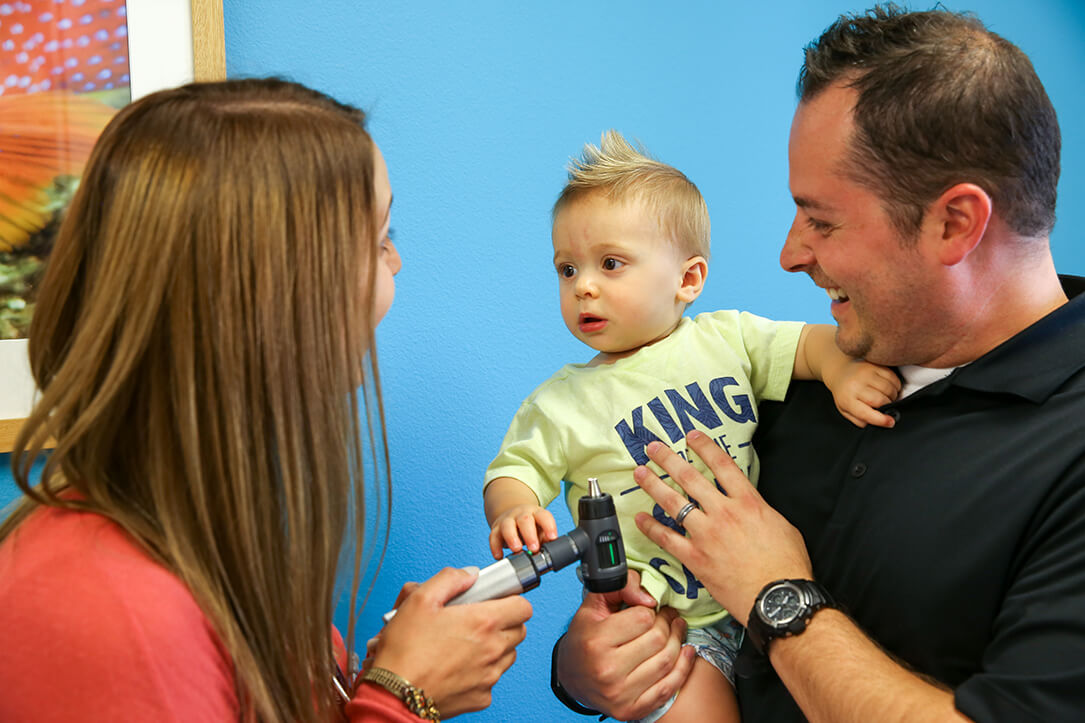As we head into the winter season, you may notice that your children are becoming sick more frequently. The most common illnesses encountered by our pediatric group during this time of year are upper respiratory infections, croup, sore throats, and ear infections. There are many common concerns that parents have such as Why is this cough lasting so long? Does my child need antibiotics? How high of a fever is too high? Does my 18-month old has Strep throat? Why is my child always sick?
One of the most common reasons for a parent to bring their child to the Doctor’s office this time of year is a viral upper respiratory infection, otherwise known as “the common cold.”
The common cold may be caused by any one of hundreds of different viruses and do not require antibiotics. Antibiotics are medications that have been developed to treat infections caused by bacteria and have no effect on viruses. That being said, when your child develops a cold due to a virus, they can become susceptible to bacterial infections such as ear infection, sinus infection, or pneumonia.
Cold symptoms can include a combination of sore throat, cough, stuffy and/or runny nose, fevers in the first 1-2 days, and headache. While worrisome, if the symptoms have been present for a week to 10 days and seem to be improving, little more than rest and symptomatic management are required. Most colds will worsen over the first 3 to 5 days, start to improve around day 7, and mostly resolve around day 10. The cough, however, can sometimes last up to 20 days.
The mainstay of cold treatment continues to be treating your child’s symptoms and making sure they get plenty of rest.
Acetaminophen and ibuprofen are best for controlling fevers and discomfort. Be sure to check with your doctor about appropriate dosing. Cough is difficult to treat and often times over the counter medications provide little to no relief. In children older than 12 months, one tablespoon of honey can help decrease cough and is very safe to give during the day and before bedtime. It can be given in some warm water, mixed in with a tea, or just right from the spoon. Cough drops may be used in older children as well. Nasal saline irrigation is very helpful for clearing the nose of mucus, which often makes it difficult for your child to breathe while eating and sleeping. Using just a few drops in each nostril, then using a bulb suction to remove some of the mucous (or having your older child blow their nose) can really help make them feel more comfortable. Humidifiers, if available, can also provide some comfort.
While the typical cold may last up to 10 days without causing concern if you are noticing improvement, there are some signs to watch for that may mean your child has developed a bacterial infection. The first clue is if a fever over 100.5 degrees develops after other cold symptoms improve. Increased fevers after 5 days of symptoms should always be evaluated by your physician.
Important points to remember:
- Fevers in a normal viral cold occur in the first 1-3 days
- Cough can normally last up to 20 days, as long as it’s not worsening
- New or ongoing daily fevers over 100.5 degrees after 5 days of cold symptoms should always be evaluated by a physician
- Nasal congestion or runny nose that is worsening or not improving after 10 days may be a sinus infection
- If you are ever in doubt or have concerns, schedule an appointment with your child’s physician
Be sure to return as I will be discussing these in the next few blog posts.
If you would like your child to be seen by a Canyon View Pediatrics provider please call 801-894-1333 to schedule an appointment.



